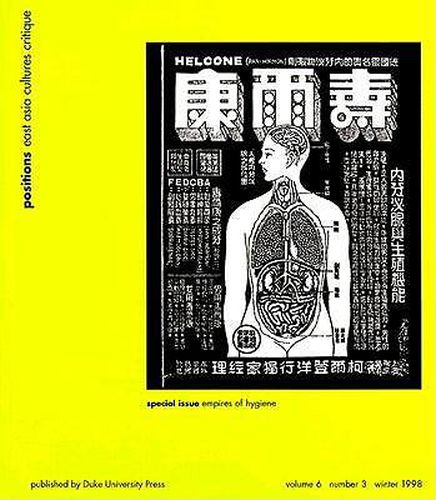Readings Newsletter
Become a Readings Member to make your shopping experience even easier.
Sign in or sign up for free!
You’re not far away from qualifying for FREE standard shipping within Australia
You’ve qualified for FREE standard shipping within Australia
The cart is loading…






Applying critical research on healing and the body to Asian studies, the articles in Empires of Hygiene challenge the assumptions about the universality of medical truth. This collection investigates how medicine, the craft of healing, also acts as a sort of hygiene - a disciplinary agent against the unruly forces of nature and culture. Assuming the complicity of scientific medical practice with forms of dominaton and exclusion, the contributors not only demonstrate how medicine has been used as a tool of empire but also ways in which events and institutions have literally transformed bodily life in Asia. Featuring a variety of topics and methods, essays in Empires of Hygiene compare the disease that is physically suffered to that which is scientifically classified and identified as a social problem. Diseases such as leprosy and STDs, which have biomedical identities in Western settings but in Asia emerge as inseparable from certain colonial regimes, are examined. The collection also addresses imperial themes of pre-war Japan in the literary works of Mori Rintaro and Shimazaki Tison.
$9.00 standard shipping within Australia
FREE standard shipping within Australia for orders over $100.00
Express & International shipping calculated at checkout
Applying critical research on healing and the body to Asian studies, the articles in Empires of Hygiene challenge the assumptions about the universality of medical truth. This collection investigates how medicine, the craft of healing, also acts as a sort of hygiene - a disciplinary agent against the unruly forces of nature and culture. Assuming the complicity of scientific medical practice with forms of dominaton and exclusion, the contributors not only demonstrate how medicine has been used as a tool of empire but also ways in which events and institutions have literally transformed bodily life in Asia. Featuring a variety of topics and methods, essays in Empires of Hygiene compare the disease that is physically suffered to that which is scientifically classified and identified as a social problem. Diseases such as leprosy and STDs, which have biomedical identities in Western settings but in Asia emerge as inseparable from certain colonial regimes, are examined. The collection also addresses imperial themes of pre-war Japan in the literary works of Mori Rintaro and Shimazaki Tison.